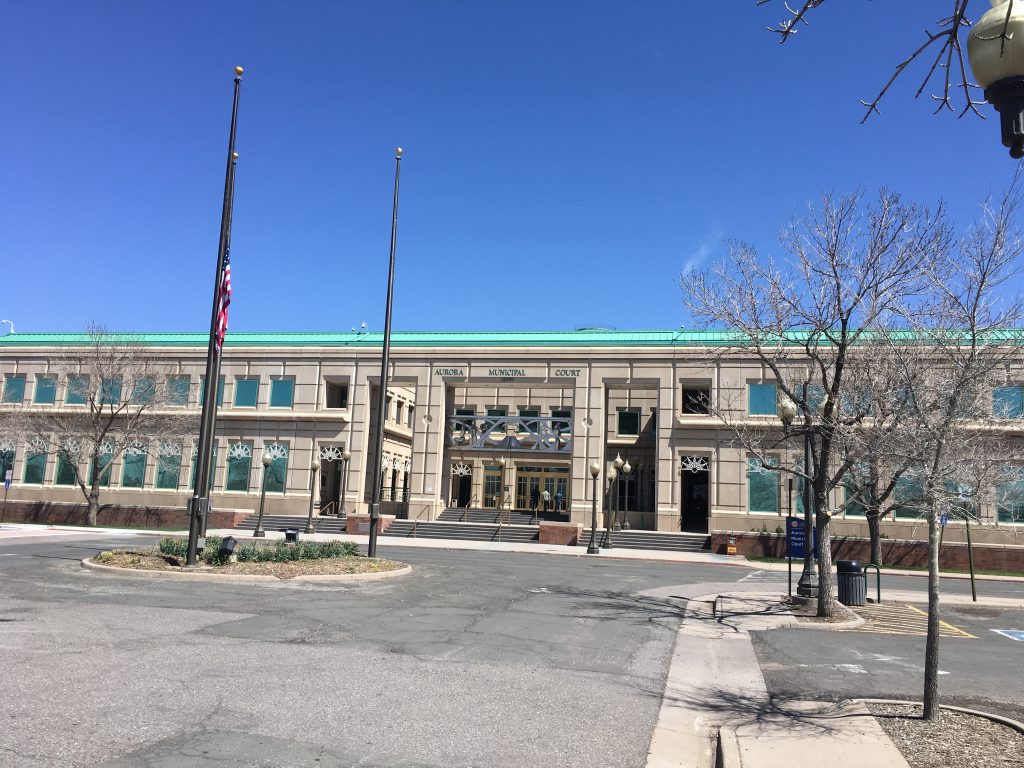 The Aurora Municipal Court located at 14999 East Alameda Parkway, Aurora, Colorado 80012 presides over violations of the Aurora Municipal Code. These matters include traffic tickets (both traffic criminal offenses and traffic infractions), parks and open space charges, certain criminal matters, neighborhood services charges, overweight commercial truck charges, animal services violations, and fire department related charges. Other summonses issued by the Aurora Police Department for alleged violations of state statues are heard by either Douglas County Court in Castle Rock, Arapahoe County Court in Centennial, or Adams County Court in Brighton.
The Aurora Municipal Court located at 14999 East Alameda Parkway, Aurora, Colorado 80012 presides over violations of the Aurora Municipal Code. These matters include traffic tickets (both traffic criminal offenses and traffic infractions), parks and open space charges, certain criminal matters, neighborhood services charges, overweight commercial truck charges, animal services violations, and fire department related charges. Other summonses issued by the Aurora Police Department for alleged violations of state statues are heard by either Douglas County Court in Castle Rock, Arapahoe County Court in Centennial, or Adams County Court in Brighton.
The Aurora Police Department has 696 sworn officers, making it the 2nd largest police department in Colorado. The city of Aurora covers a sprawling 163 square miles. In light of Aurora’s population (3rd largest city in Colorado) and the number of sworn officers, the Municipal Court sees an abundance of drivers charged with all kinds of traffic offenses and infractions.
Aurora Municipal Court has adopted the Colorado Model Traffic Code.
Traffic infractions in Aurora Municipal Code are punishable by a fine of not more than $2650.00 and points assessed against the person’s driver’s license. Traffic infractions are not criminal offenses. People who are charged with a traffic infraction do not have a right to a trial by jury, they only have a right to a bench trial (trial by judge- also known as a final hearing).
Certain traffic offenses in Aurora Municipal Court are categorized as criminal and therefore the possible penalty is up to 1 year in jail and up to a $2650.00 fine. People who are charged with criminal traffic offenses have the right to a trial by jury but they must pay the jury trial fee and submit a written jury trial demand to the court within the required time period. Criminal traffic offenses under the Aurora Municipal Code include, but are not limited to: careless driving, reckless Driving, speeding 25mph or more over the limit, no insurance, speed contest/drag racing, use of a radar jamming device, eluding a police officer, failure to yield to an emergency vehicle, and not stopping for a school bus.
If the traffic charge relates to a non-criminal traffic infraction and the person fails to appear in court as directed by the summons, then a “default judgment” will enter including a fine and costs as well as the full points charged in the summons. An arrest warrant will not issue for a failure to appear on a traffic infraction. However, a warrant will issue if the person was charged with any criminal traffic offense(s) in the summons. Sometimes a default judgment that enters for failure to appear on a non-criminal traffic infraction may be set aside for “good cause” or “excusable neglect”. A motion to Aurora Municipal Court to set aside a default judgment on a traffic infraction must be made not more than 10 days after entry of the default judgment. The Court may rule on the motion after the 10 day period, however the motion must be submitted within the 10 day period.
Discovery (police report, officer’s notes, etc.) requests for traffic cases must be made to the Aurora City Attorney’s Office – Criminal Justice Division. Thereafter the person must appear at a scheduled appointment with the City Attorney’s Office to pick up the discovery and review any criminal and/or driving history.
Aurora Traffic Attorney Monte Robbins has successfully represented many clients with traffic charges, both criminal traffic offenses and civil traffic infractions, in Aurora Municipal Court. Contact Aurora Traffic Ticket Lawyer Monte Robbins today for a free case evaluation regarding your Aurora Municipal Court traffic matter: 303-355-5148.
 Denver DUI Attorney Blog
Denver DUI Attorney Blog

